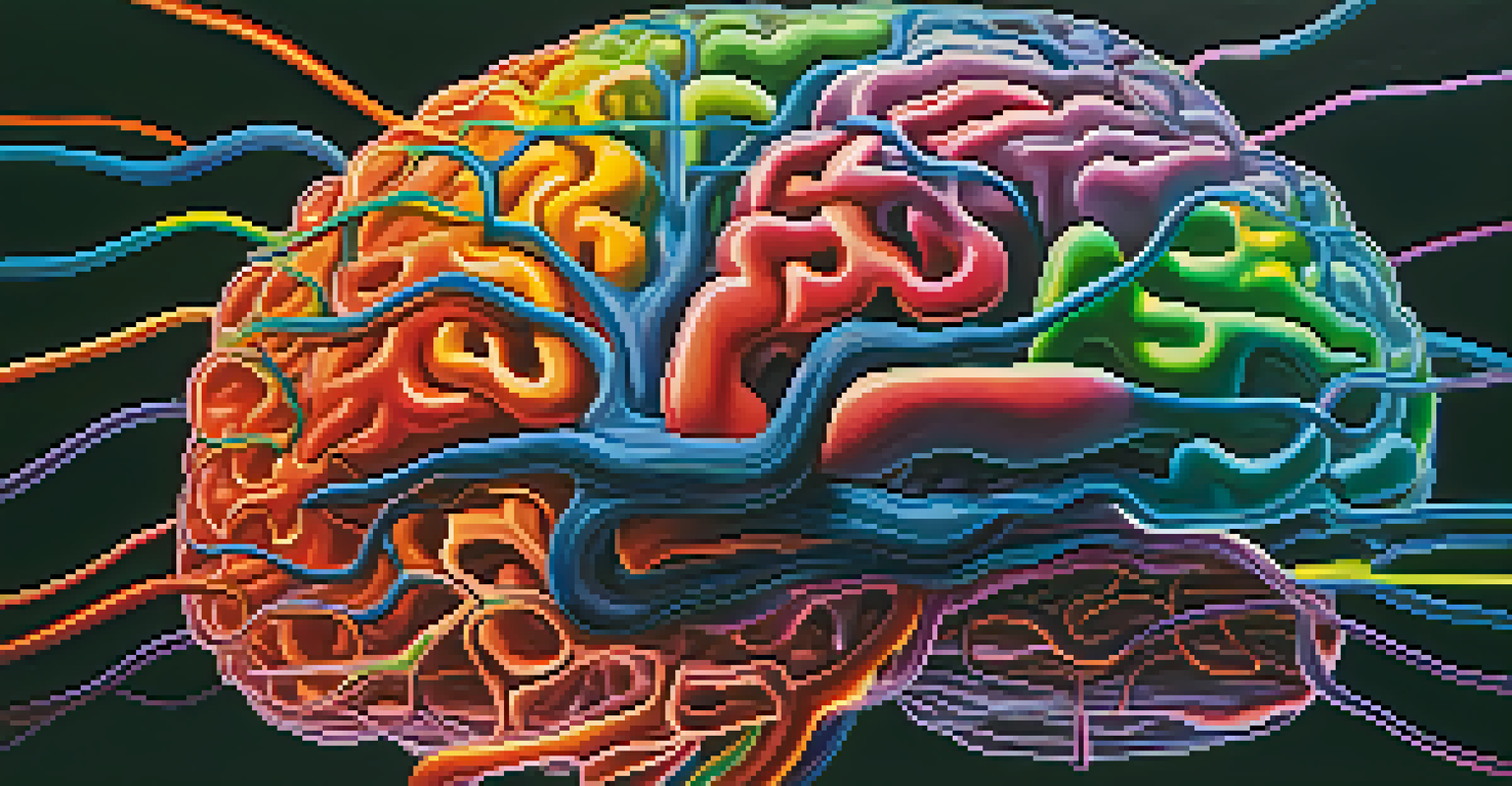Hallucinogens and the Brain: Memory Formation Mechanisms

Understanding Hallucinogens: A Brief Overview
Hallucinogens are substances that alter perception, mood, and cognitive processes. Common examples include LSD, psilocybin, and mescaline, each known for inducing vivid sensory experiences. These substances can lead to altered states of consciousness, where users may experience things that aren't present in reality. The effects of hallucinogens can vary significantly from person to person, making them fascinating yet complex substances.
The greatest discovery of my generation is that a human being can alter his life by altering his attitude.
When ingested, hallucinogens primarily interact with serotonin receptors in the brain, particularly the 5-HT2A receptor. This interaction is thought to play a key role in the changes in perception and mood that users experience. Understanding this interaction is essential to grasping how these substances might influence memory formation. The brain's intricate network of neurotransmitters becomes a playground for these compounds, reshaping how we process experiences.
Research into hallucinogens has surged over recent years, revealing potential therapeutic benefits for conditions like PTSD and depression. This has sparked interest in understanding not just the risks, but also the cognitive effects, including memory. By studying how these substances impact memory formation, we can better comprehend their potential roles in both neuroscience and psychology.
The Brain's Memory Formation Process Explained
Memory formation is a complex process that involves several stages: encoding, storage, and retrieval. During encoding, the brain converts sensory input into a form that can be stored and later recalled. This is where the hippocampus plays a critical role, helping to process and organize information for long-term memory storage. Understanding this process is vital when exploring how hallucinogens might alter or enhance memory.

Storage involves the consolidation of memories, a process where short-term memories are transformed into long-term ones. This stage is influenced by various factors, including emotions and the context of the experience. Hallucinogens can intensify emotions, leading to stronger memory formation during their use. This emotional amplification can create vivid and lasting memories, sometimes referred to as “trip memories.”
Hallucinogens Alter Memory Processes
Hallucinogens impact the stages of memory formation, including encoding, storage, and retrieval, leading to both enhanced and distorted memories.
Finally, retrieval is the process of recalling stored memories, which can be influenced by various factors, including cues and context. Hallucinogens may alter how we access memories, sometimes leading to enhanced recall or, conversely, memory distortions. By understanding these stages, we can begin to see how hallucinogens might impact memory in both positive and negative ways.
Hallucinogens and Their Impact on Memory Encoding
The encoding phase of memory can be significantly affected by hallucinogens. Users often report heightened awareness and sensory perception, which can lead to stronger encoding of experiences. For example, a vibrant visual experience during a hallucinogenic trip may become etched into memory more deeply than a mundane event. This heightened state can help create vivid memories that feel more real and significant.
We do not remember days, we remember moments.
However, the subjective nature of hallucinogenic experiences can also lead to confusion in memory encoding. Since users may perceive reality differently, the information encoded can be distorted or incomplete. This phenomenon can result in a blend of real and imagined experiences, making it difficult to distinguish between the two when recalling memories. Such distortions raise questions about the reliability of memories formed under the influence of hallucinogens.
Moreover, the emotional context during a hallucinogenic experience plays a crucial role in how memories are encoded. Strong emotions can enhance memory retention, making certain experiences more memorable. For instance, a profound insight or emotional revelation during a trip may lead to an unforgettable memory, often described as life-changing. This aspect highlights the dual-edged nature of hallucinogens in relation to memory.
How Hallucinogens Affect Memory Storage Mechanisms
Once memories are encoded, the next phase is storage, where hallucinogens also play a role. The brain's ability to consolidate memories can be influenced by the emotional intensity experienced during a trip. For instance, if a user feels extreme joy or fear, this emotional weight may enhance memory consolidation, making those moments more likely to be retained long-term. This can result in a rich tapestry of experiences that are vividly remembered.
The interaction between hallucinogens and neurotransmitters like dopamine and serotonin can also affect how memories are stored. These neurotransmitters are involved in reward pathways and mood regulation, and their modulation during hallucinogenic experiences can impact memory consolidation. This means that the very act of experiencing something profound while under the influence may enhance its permanence in the brain's storage system.
Therapeutic Uses for Memory Disorders
Research indicates that hallucinogens like psilocybin may offer therapeutic benefits for memory-related disorders, such as PTSD and depression.
However, the effects of hallucinogens on memory storage are not universally positive. In some cases, users may experience lapses in memory or an inability to recall certain events clearly. This highlights the unpredictability of how hallucinogens can shape memory storage, making it a complex area for further research. Understanding these nuances is essential for both therapeutic applications and potential risks associated with hallucinogen use.
Retrieval of Memories Under the Influence of Hallucinogens
Retrieving memories formed during hallucinogenic experiences can be a unique process. Users often find that memories accessed during these trips are vivid and emotionally charged, leading to a stronger sense of recall. This can be particularly impactful when recalling moments of insight or emotional clarity, making those memories feel more profound. The interplay of emotions and sensory experiences creates a rich backdrop for memory retrieval.
However, the retrieval process can also be clouded by the nature of hallucinogenic experiences. Since these substances can distort perception, users may struggle to differentiate between actual events and imagined experiences. This can lead to confusion when recalling memories, as users may inadvertently blend reality with the altered perceptions experienced during their trip. Such challenges underscore the importance of understanding the context in which memories are formed and retrieved.
In some cases, hallucinogens can trigger memories that users might not have accessed otherwise. This phenomenon can lead to revelations or insights that feel significant, often tied to past experiences. These unexpected memories can be both enlightening and confusing, as they may resurface in a fragmented or altered form. This highlights the intricate relationship between hallucinogens and memory retrieval, revealing a landscape that is both fascinating and complex.
Therapeutic Potential of Hallucinogens on Memory Disorders
The exploration of hallucinogens has opened doors to potential therapeutic applications, particularly in treating memory-related disorders. Research suggests that substances like psilocybin and MDMA may help individuals with PTSD and depression by facilitating emotional processing. This could lead to improved memory retrieval and processing of traumatic events, offering new hope for those struggling with such conditions.
For instance, in clinical settings, patients may be guided through their memories while under the influence of hallucinogens, allowing them to confront and reframe their experiences. This process can enhance memory consolidation and retrieval, leading to breakthroughs in understanding and healing. The emotional release often experienced can help in forming healthier memory associations, potentially reducing the grip of traumatic memories.
Emotional Intensity Shapes Memory
The emotional experiences during hallucinogenic trips can significantly influence how memories are formed and recalled, creating vivid yet sometimes confusing recollections.
However, while the therapeutic potential is promising, it also raises ethical questions and concerns about the risks associated with hallucinogen use. The unpredictable nature of these substances means that not everyone will have a positive experience, and adverse effects can occur. Therefore, ongoing research is essential to carefully navigate these waters and ensure that the benefits can be harnessed safely and effectively.
Conclusion: The Complex Relationship Between Hallucinogens and Memory
In summary, hallucinogens have a multifaceted impact on memory formation, influencing encoding, storage, and retrieval. While they can enhance the vividness and emotional depth of memories, they can also introduce distortions and confusion. This duality makes hallucinogens both intriguing and complex in their interactions with the brain's memory systems.
As research continues to unfold, understanding the mechanisms behind these substances will be crucial in determining their therapeutic potential. By exploring how hallucinogens affect memory formation, we can better grasp their roles in both healing and personal growth. This knowledge can empower individuals and professionals to navigate the landscape of hallucinogens responsibly, whether for therapeutic or recreational use.

Ultimately, the exploration of hallucinogens and their effects on memory formation opens up new avenues for understanding the human mind. As science delves deeper into these substances, we may find innovative ways to leverage their effects for mental health and well-being, while also recognizing the importance of cautious and informed use.